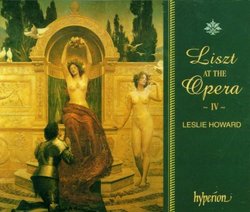| All Artists: Franz Liszt, Leslie Howard, Philip Moore Title: Liszt at the Opera, Vol 4 Members Wishing: 1 Total Copies: 0 Label: Hyperion UK Release Date: 12/17/1996 Album Type: Import Genres: Special Interest, Classical Styles: Marches, Opera & Classical Vocal, Chamber Music, Historical Periods, Classical (c.1770-1830) Number of Discs: 2 SwapaCD Credits: 2 UPC: 034571171012 |
Search - Franz Liszt, Leslie Howard, Philip Moore :: Liszt at the Opera, Vol 4
 | Franz Liszt, Leslie Howard, Philip Moore Liszt at the Opera, Vol 4 Genres: Special Interest, Classical
|
Larger Image |
CD Details |
CD ReviewsLiszt the Impresario - Part 4 Hexameron | 08/22/2006 (5 out of 5 stars) "Hyperion's and Leslie Howard's "Liszt at the Opera" series is a milestone of the Liszt discography. While a slew of pianists churn out rehashed Hungarian Rhapsodies, Transcendental Etudes and typical standard fare from Liszt's pen, there are dozens of neglected but outstanding pieces virtually unknown to most. Liszt's many transcriptions, fantasies and paraphrases on operatic themes are a substantial part of his oeuvre and should not be ignored. Quite the contrary, it's time for them to return to the forefront. Fortunately, Howard continues his quest to unveil all of Liszt's piano music; he sheds light on a fascinating portion of the master's repertoire, music that overwhelms with virtuosity, moves with poetic inspiration, and entices with frankly catchy themes and strains of lyricism.
Composers and operas featured in the works on this volume run the gamut from popular, marginalized, to the forgotten. The Reminiscences of Bellini's "Il Puritani" is a titanic (20 minute) fantasy of typical grandiosity and elaborate pianistic embellishment on a dramatic level similar to Liszt's "Don Juan" or "Norma" Reminiscences. This is a musically attractive and potent concert work deserving of more recordings, and yet it is receiving its world premiere recording. Both versions of Liszt's paraphrase on Verdi's "I Lombardi" are transcending pieces of radiance and angelic beauty. Whether it's the inherent profundity of the "Salve Maria" number or Howard's delicate execution, this is stunningly gorgeous music. I detect a pattern of quality whenever Liszt deals with Verdi's material (Il Trovatore, Ernani, Rigoletto, Simon Boccanegra): the festival music and funeral march from "Don Carlos" are ravishing in their duality of expression. The festival music is jovial and uplifting, replete with a pastoral quality, while the funeral march is sinister and foreboding. Perhaps the most unjustly neglected original fantasy on the first disc is the Reminiscences of Donizetti's "Lucrezia Borgia." The grand large-scale work was cut in half due to its length, but together they form a nearly 26 minute fantasy. Donizetti's melodic material is hued with intensity, melodious brilliance, and dazzling virtuosity. This two-movement fantasy is a convincing tour-de-force and I'm puzzled by its obscurity. The second disc contains the best music of this 2-CD set. I'm not particularly thrilled with Howard's interpretation of the Reminiscences of Meyerbeer's "Les Huguenots" (I suggest Arnaldo Cohen's fiery execution found here: Franz Liszt: Complete Piano Music, Vol. 1), but the work is one of Liszt's crowning achievements in the area of operatic fantasies. With this Reminiscence, Liszt proves that piano fantasies can be masterpieces rather than salon/concert trifles. Joachim Raff (1822-1882) was a respected composer and teacher who assisted Liszt with orchestrating his symphonic poems. After hearing Liszt's faithful transcriptions of numbers from Raff's "King Alfred," it is distressing to think Raff's works are gathering dust. The "Andante" number is evocative of Liszt's Liebestraumen, oozes with tenderness and shocking beauty. The subsequent march is less impressive but still a sparkling delight. The sidestep into Mozart's music is an unusual but rewarding one for the listener. Liszt's reasons for choosing to transcribe the austere "Song of the Two Armed Men" from the Magic Flute are baffling. Nevertheless, the transcription is exquisite and the piano color conveys a starker quality of the number. Liszt's proclivity for extravagant virtuosity is usually criticized, but I'm always arrested by it, especially in the "Tarantelle di bravura" on Auber; it is a blazing joyride with signature Lisztian virtuosity that leaves a smile on my face every time. Considered a warhorse in its time, the "Introduction and Polonaise" to Bellini's "I Puritani" is invigorating, flashy and as satisfying as the Rigoletto paraphrase. Indeed, one may find its mere 5 minute-length just too brief. One last work deserving of commentary is Liszt's Grand Concert Fantasy on Bellini's "La Sonnambula." It is interesting to compare Thalberg's fantasy on the same opera to Liszt's efforts. But in Liszt's work, there is a striking and haunting moment of sublimity framed by the giddy and bravura sections. I wish I knew the opera well enough to point to this profound nocturne-like number; it is heart-breaking, lamenting, and no doubt enhanced by Liszt's pianistic arrangement and Howard's histrionics. Bottom line: Howard and Hyperion have unearthed genuine diamonds. Too many listeners stay in the shallow waters of standard Liszt repertoire and they are missing out on the rewarding depths of his output. There are world premiere recordings here and I think all pianophiles and Lisztians would enjoy exploring these fantasies and transcriptions." |

 Track Listings (7) - Disc #1
Track Listings (7) - Disc #1